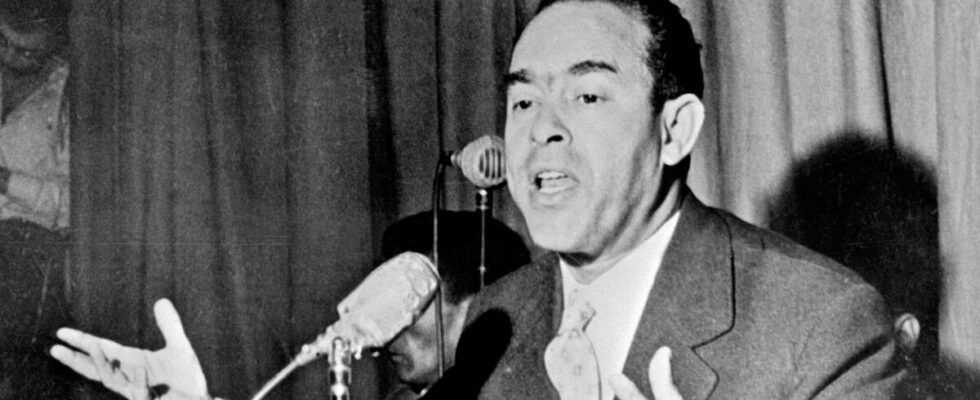October 29, 1965, in Paris. While having an appointment with the filmmaker Georges Franju, the Moroccan political opponent Mehdi Ben Barka is arrested in front of the Lipp brewery, boulevard Saint-Germain, then loaded into a police car, which spins rue de Rennes. A few days later, south of Paris, the dissident is tortured and murdered. Fifty-six years later, gray areas persist on this affair. The responsibilities of the Moroccan and French secret services remain unclear. What did Gaullist power know at the time? What role have the French authorities played, which have always refused to make certain archives public?
Today, declassified archives of the Czechoslovak secret service, studied by a young Czech historian interviewed by the British weekly The Observer, lift a small part of the veil on the political activities of Ben Barka before his death. According to this dossier of more than 1,500 pages, “Ben Barka not only maintained close relations with the Státní bezpecnost (StB), the dreaded Czechoslovak security service, but also received large payments, in cash and in kind.”.
“A very dangerous game”
The links between the East and the independence activist had already been revealed by a Czech journalist, Petr Zidek, fifteen years ago. The case, at the time revealed by the Express, was reopened by historian Jan Koura. Cross-checking the archives with thousands of other recently released documents, this professor at Charles University in Prague portrays Ben Barka as “A man who played on several tables, who knew a lot and who also knew that information was very precious in times of cold war”. In the columns of The Observer, the historian does not go dead hand, qualifying Ben Barka of“Opportunist who was playing a very dangerous game”.
According to these archives, the links between the Moroccan dissident and the StB began in 1960. Arrived in Paris to flee the authoritarian regime of Hassan II, Ben Barka then met a Czech spy. Morocco, a former French protectorate, looked at the time towards Moscow and interested the authorities of the countries of the Eastern bloc. Especially since Ben Barka is the founder of the Socialist Party of his country, that he has links with, among others, Nelson Mandela, Malcom X and Che Guevara. According to the Czech services, Mehdi Ben Barka therefore represents a source of information “Extremely valuable”. A code name is given to him: “Sheikh”.
The leader of the struggle for Moroccan independence then provides reports on his country of origin, in exchange for cash payments. The first, 1,000 French francs in September 1961, rewarded information on the French secret services presented as classified defense by Ben Barka when they were in the public domain. Despite everything, the collaboration continues and Ben Barka is sent all expenses paid to West Africa, in particular to gather information on American activities in Equatorial Guinea. The anti-imperialist leader multiplies the missions abroad: he visits Iraq, Algeria where he meets Ahmed Ben Bella, or even Egypt, then led by Nasser… He provides Prague with information on the political context in these countries, while several of them achieve independence. As a reward for his services, the man and his four children were, among other things, invited on vacation to a spa in Czechoslovakia, according to Koura’s research.
Close to Beijing?
Very quickly, the Czechoslovaks suspected the intellectual of maintaining links with other countries. A double agent, Ben Barka? In February 1962, a meeting between “Cheikh” and an American trade unionist, in a Parisian bar, fueled suspicion. The independence activist would then have received US dollars. What to suggest that he would work in parallel for the CIA … “The StB has received other reports alleging that Ben Barka was in contact with the United States, although the Moroccan politician has always denied when confronted with this information”Jan Koura told the Observer. The records also show that the political dissident would have received 10,000 dollars from Beijing, China then pressing so that the activist no longer has protection from the Czechoslovakian services.
Mehdi Ben Barka has never confirmed that he was collaborating with foreign secret services. His family has also always denied such ties. A fervent defender of Third Worldism, a movement that cultivated the independence of countries not aligned on the two blocs, American and Soviet, Ben Barka could not, according to his descendants, have engaged in such activities. Solicited by the Express in 2007, Bachir Ben Barka, one of the son of the disappeared, rebelled against what he called‘”Memory impairment” from his father. According to Jan Koura, these links do not, however, “no doubt”.
